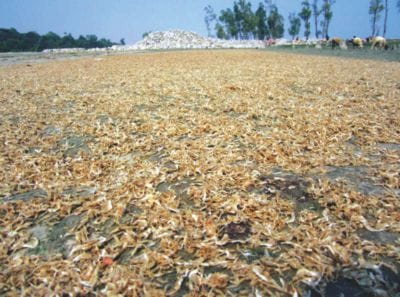Consumers at risk as dried fish processed in dirty environment

A large amount of small fishes are spread on the dirty soil at Dhulishar in Kalapara upazila under Patuakhali district for drying in the sun, exposing the consumers to serious health hazard.Photo: STAR
A section of fishermen are engaged in drying fish on the sea beach and canal banks in awfully dirty environment, posing health hazard to consumers.
During the ongoing dry season, fishermen often spread large amounts of small fishes to dry on the sandy beach or canal banks, causing sand, dirty soil, and even dung to mix with the fishes.
"We are drying fish in such a way as it is costly to make platforms with wood or tree branches for the purpose. Nobody forbade us to do it," Kamrul, 14, told this correspondent during the latter's recent visit to Kawar Char area, about three km to the south of Kuakata zero point.
The boy, engaged by fishermen, was watching fishes spread on three plots to save them from being trampled by cows, goats, sheep or buffalos or other animals while fishermen went to the sea or river for fishing.
Fishermen are drying fishes in at least 20 spots in these areas including Ramnabad River site Patua, Charipara, Burajalia, Chandupara, Dhos, Chardhulasar, Kawsar Char, Gongamoti, Khajura, Khalgora, Naioripara, Jalapur in the running dry season.
"A section of fishermen are now engaged in drying fish as they are relatively free during the ban period of netting jatka from November to May. Locals as well as tourists buy it," said Shahjahan Akon of Khajura area.
These small sized dry fishes sell for Tk 100 to 150 per kg and poor people buy it as there is not adequate supply of fresh fish in the marker in the dry season, said Abul Hossain of Gongamoti area.
Dr Abdur Rahim, Kalapara upazila health officer, said one may have food poisoning and other problems by taking the dried fish that are processed in such a dirty environment.
Hasnain Parvez, in charge of Kuakata police camp, said, "As I asked some fishermen about the matter they said these dry fish is used to make poultry feed. We will see the matter as it is related with public health."

 For all latest news, follow The Daily Star's Google News channel.
For all latest news, follow The Daily Star's Google News channel. 



Comments